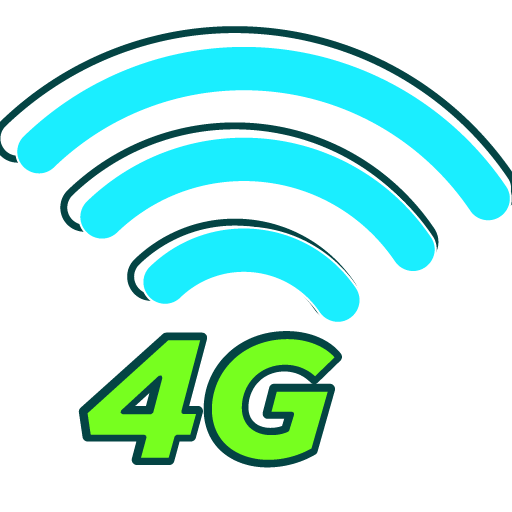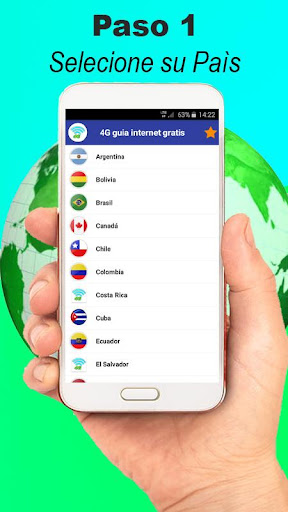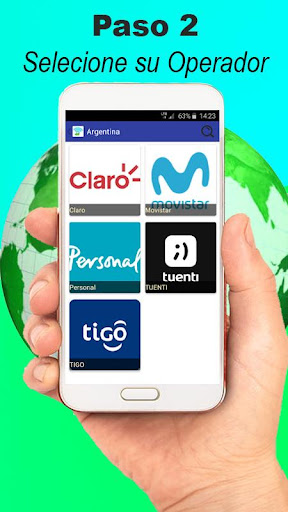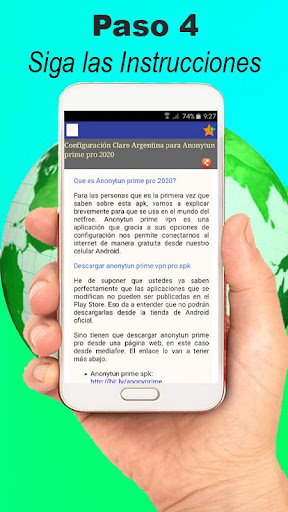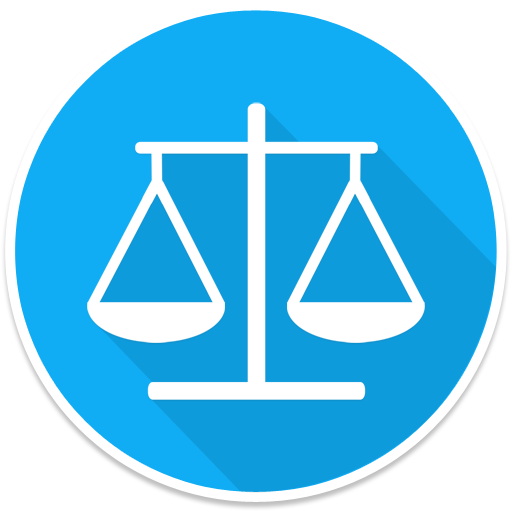In 4G free internet guide, you will find several tutorials and methods to know how to have a safe, free and unlimited Internet for each country. They work on any device with Android, among other Chinese brands and models.
Faster, safer with the following advantages:
✔ Connection is easy, convenient
✔️ Free: 100% installation and use
✔️ No limit of use
✔️ 4g is fast and absolutely safe
✔️ You can get freedom to see applications and websites from anywhere in the world
✔️ Easy to use application
In addition, it includes other useful features to improve your Internet experience:
+ Guarantee a secure connection and protect your internet
+ The tutorials and methods have been created with great detail and images, to allow a better experience and to be simple to use.
So you can enjoy watching movies or browsing websites. In addition to that, you can also stop the connection at any time. Increase your privacy and security. When connecting.
We are constantly working on updating the methods. And at the same time they are oriented to users from different countries of the world such as: Argentina, Bolivia, Brazil, Canada, Chile, Colombia, Costa Rica, Ecuador, El Salvador, Spain, Guatemala, Honduras, Indonesia, Mexico, Nicaragua, Panama, Paraguay , Peru, the Dominican Republic, United States, Uruguay, Venezuela and many more.
Content
The pursuit of free internet access has driven innovation and spurred the development of various technologies, but the concept of a "4G internet guide without data" is fundamentally flawed. True 4G internet, by definition, requires a cellular data connection. The "4G" designation refers to the fourth generation of mobile network technology, a standard that relies on data transmission through licensed radio frequencies. These frequencies are managed by telecommunication companies who provide access through data plans. Therefore, any claim of 4G internet access without a data plan is misleading.
The confusion may stem from several sources. Firstly, the term "4G" is often used colloquially to represent fast internet speed, regardless of the underlying technology. Users might encounter fast Wi-Fi networks and mistakenly label them as "4G" simply because of their speed. This mislabeling contributes to the misconception that 4G can exist independently of a data plan.
Secondly, some apps and services offer offline functionality that can mimic aspects of internet access. These apps might allow users to access pre-downloaded content, like maps or articles, giving the illusion of being online. However, this offline access is not true internet connectivity; it is merely accessing locally stored information. The moment a user attempts to interact with live data, such as sending a message or browsing the web, the need for a data connection becomes immediately apparent.
Thirdly, the concept of public Wi-Fi hotspots often gets intertwined with the idea of free 4G. Public Wi-Fi offers internet access without depleting a user's personal data allowance. However, Wi-Fi operates on a different technology than 4G. While both provide internet access, they are distinct systems with separate infrastructures. Confusing public Wi-Fi with 4G without data perpetuates the misunderstanding.
Furthermore, some misleading advertisements or online tutorials might promote methods to supposedly access 4G without a data plan. These methods often involve exploiting security vulnerabilities or utilizing unauthorized access points, both of which are illegal and unethical. Engaging in such practices can expose users to significant security risks and potential legal repercussions.
The reality is that accessing the internet through 4G requires a data plan. Telecommunication companies invest heavily in infrastructure and spectrum licenses to provide 4G services. Offering these services free of charge is not a sustainable business model. While free public Wi-Fi offers an alternative for accessing the internet without using personal data, it is a separate technology from 4G and has its limitations in terms of availability and security.
Therefore, any claim of a "4G internet guide without data" should be treated with skepticism. Understanding the fundamental principles of 4G technology clarifies the impossibility of accessing it without a data plan. Focusing on legitimate methods of internet access, such as subscribing to a data plan or utilizing secure public Wi-Fi networks, is crucial for staying connected while respecting legal and ethical boundaries. Misinformation regarding free 4G access not only creates unrealistic expectations but also potentially exposes users to security risks and fraudulent schemes. A clear understanding of how 4G and other internet access methods work is essential for navigating the digital landscape safely and effectively.
In 4G free internet guide, you will find several tutorials and methods to know how to have a safe, free and unlimited Internet for each country. They work on any device with Android, among other Chinese brands and models.
Faster, safer with the following advantages:
✔ Connection is easy, convenient
✔️ Free: 100% installation and use
✔️ No limit of use
✔️ 4g is fast and absolutely safe
✔️ You can get freedom to see applications and websites from anywhere in the world
✔️ Easy to use application
In addition, it includes other useful features to improve your Internet experience:
+ Guarantee a secure connection and protect your internet
+ The tutorials and methods have been created with great detail and images, to allow a better experience and to be simple to use.
So you can enjoy watching movies or browsing websites. In addition to that, you can also stop the connection at any time. Increase your privacy and security. When connecting.
We are constantly working on updating the methods. And at the same time they are oriented to users from different countries of the world such as: Argentina, Bolivia, Brazil, Canada, Chile, Colombia, Costa Rica, Ecuador, El Salvador, Spain, Guatemala, Honduras, Indonesia, Mexico, Nicaragua, Panama, Paraguay , Peru, the Dominican Republic, United States, Uruguay, Venezuela and many more.
Content
The pursuit of free internet access has driven innovation and spurred the development of various technologies, but the concept of a "4G internet guide without data" is fundamentally flawed. True 4G internet, by definition, requires a cellular data connection. The "4G" designation refers to the fourth generation of mobile network technology, a standard that relies on data transmission through licensed radio frequencies. These frequencies are managed by telecommunication companies who provide access through data plans. Therefore, any claim of 4G internet access without a data plan is misleading.
The confusion may stem from several sources. Firstly, the term "4G" is often used colloquially to represent fast internet speed, regardless of the underlying technology. Users might encounter fast Wi-Fi networks and mistakenly label them as "4G" simply because of their speed. This mislabeling contributes to the misconception that 4G can exist independently of a data plan.
Secondly, some apps and services offer offline functionality that can mimic aspects of internet access. These apps might allow users to access pre-downloaded content, like maps or articles, giving the illusion of being online. However, this offline access is not true internet connectivity; it is merely accessing locally stored information. The moment a user attempts to interact with live data, such as sending a message or browsing the web, the need for a data connection becomes immediately apparent.
Thirdly, the concept of public Wi-Fi hotspots often gets intertwined with the idea of free 4G. Public Wi-Fi offers internet access without depleting a user's personal data allowance. However, Wi-Fi operates on a different technology than 4G. While both provide internet access, they are distinct systems with separate infrastructures. Confusing public Wi-Fi with 4G without data perpetuates the misunderstanding.
Furthermore, some misleading advertisements or online tutorials might promote methods to supposedly access 4G without a data plan. These methods often involve exploiting security vulnerabilities or utilizing unauthorized access points, both of which are illegal and unethical. Engaging in such practices can expose users to significant security risks and potential legal repercussions.
The reality is that accessing the internet through 4G requires a data plan. Telecommunication companies invest heavily in infrastructure and spectrum licenses to provide 4G services. Offering these services free of charge is not a sustainable business model. While free public Wi-Fi offers an alternative for accessing the internet without using personal data, it is a separate technology from 4G and has its limitations in terms of availability and security.
Therefore, any claim of a "4G internet guide without data" should be treated with skepticism. Understanding the fundamental principles of 4G technology clarifies the impossibility of accessing it without a data plan. Focusing on legitimate methods of internet access, such as subscribing to a data plan or utilizing secure public Wi-Fi networks, is crucial for staying connected while respecting legal and ethical boundaries. Misinformation regarding free 4G access not only creates unrealistic expectations but also potentially exposes users to security risks and fraudulent schemes. A clear understanding of how 4G and other internet access methods work is essential for navigating the digital landscape safely and effectively.

